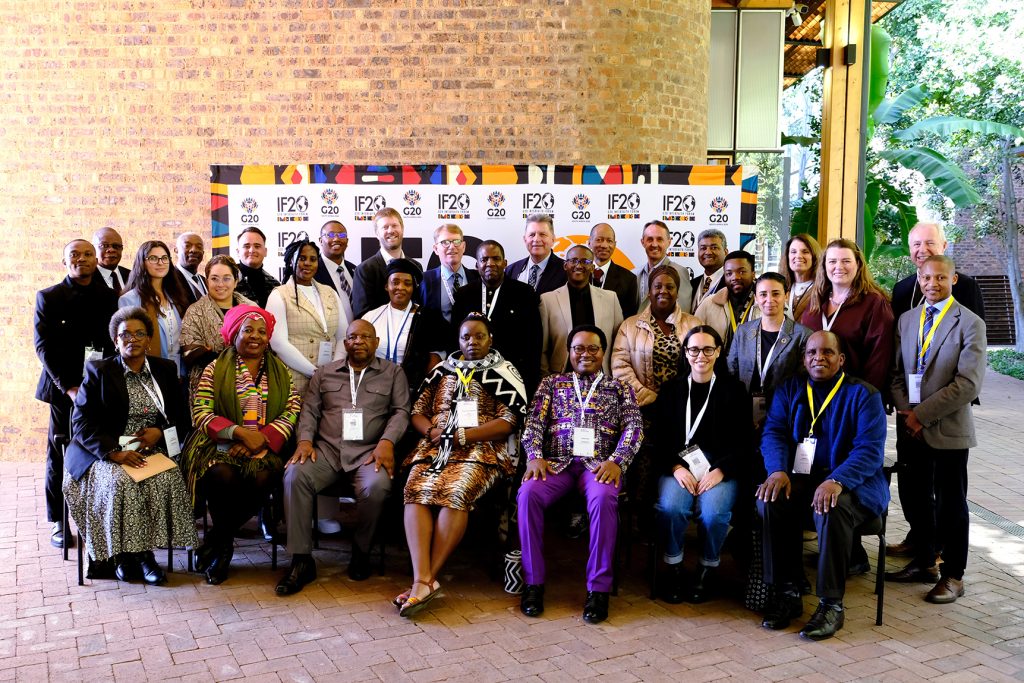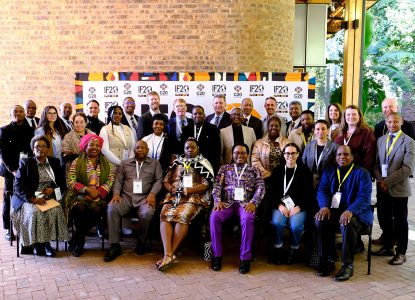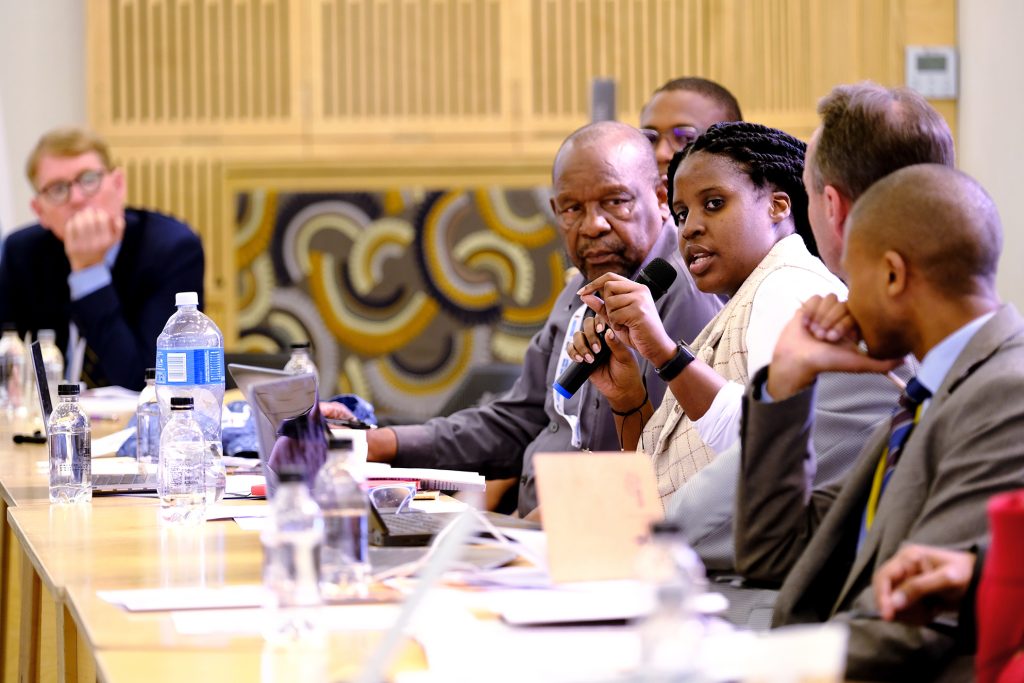By JoAnne Wadsworth, Communications Consultant, G20 Interfaith Forum.
– – –
On May 28-29, 2025, the G20 Interfaith Forum Association hosted Africa Week at Future Africa, University of Pretoria, examining how diverse stakeholders can meaningfully engage with global governance structures. This gathering featured key government officials and civil society leaders who provided practical insights into how the G20 operates and how faith-based and civil society organizations can influence policy outcomes. Mr. Ben Joubert, G20 Sherpa Track Coordinator, offered an inside look at South Africa’s presidency priorities and approach, while representatives from major engagement groups—including IF20, Values 20, Civil 20, and Oxfam—shared their strategies for amplifying marginalized voices in global policy discussions. The session also featured a pointed intervention on accountability from Solly Moeng, emphasizing the importance of domestic responsibility in governance. This represents the second of four blog posts capturing key insights from this landmark gathering.
South Africa’s People-Centered G20 Presidency
G20 Sherpa Track Coordinator Ben Joubert opened his remarks by acknowledging the collaborative nature of his role: “This is the best part of my day, to be interacting with all those role players that support us in the G20 Presidency.” He emphasized Africa’s centrality to South Africa’s foreign policy: “Africa is the major part of our foreign policy focus. Of course, in Africa, we want peace, and we want security, and we want development. We want progress for all the people on the African continent.”
Joubert explained that South Africa’s presidency concludes four years of developing countries holding the presidency of the G20, following Indonesia (2022), India (2023), and Brazil (2024). He outlined South Africa’s approach through its theme of “solidarity, equality and sustainability,” explaining that this reflects “our conviction that our challenges can only be resolved through cooperation, collaboration and partnership, albeit in a volatile and polarized geopolitical environment.”
“Africa’s G20 President, therefore stands firm in the belief that multilateral cooperation is not optional, it is imperative. Unilateral actions that determine that or that undermine a rule-based order should not be tolerated.”
Four Key Priority Areas
South Africa is advancing four specific priorities during its presidency:
Strengthening Disaster Resilience and Response: Addressing climate-related challenges that disproportionately affect developing nations.
Ensuring Debt Sustainability for Low-Income Countries: Joubert noted that about 40% of the world’s emerging and developing countries spend more money on debt service than they would spend on public health or education. He described this as the “Africa premium” that countries pay for development financing.
Mobilizing Finance for Just Energy Transition: Ensuring that the transition to cleaner energy doesn’t leave communities behind or cost jobs and livelihoods.
Harnessing Critical Minerals for Inclusive Growth: Recognizing that Africa has 30% of the world’s mineral reserves and hosts the largest reserves of cobalt, diamonds, platinum and uranium, with a focus on ensuring beneficiation takes place locally.
High-Level Deliverables and Reviews
Joubert detailed several major initiatives, including three task forces addressing inclusive economic growth, food security, and artificial intelligence governance. He also highlighted the “G20 at 20” review—a reflection on key achievements and the way forward that asks honestly “what is it that we have committed to but have not achieved?”
Central to South Africa’s approach is what Joubert called “a people centered, inclusive G20.” He emphasized:
“Our Presidency is not only about promoting working groups and the finance track, it’s also about promoting the work that you are doing and that engagement groups are doing. We are very much aware of what you are doing, and we recognize the importance thereof, and we want to take you along in the journey, because this is a whole of the South Africa approach. But more than that, it’s an approach that transcends boundaries in terms of the membership of your organizations and of the G20.”

Voices from the Engagement Groups
The panel of civil society representatives provided concrete examples of how different sectors approach G20 engagement, each bringing distinct perspectives to South Africa’s presidency themes.
IF20: Moral Authority in Global Governance
Co-Chair Maniraj Sukdaven emphasized the critical role of faith in addressing deep-rooted societal challenges such as debt, poverty, hunger, and violence—particularly in the African context. He highlighted research showing that “when religious freedom flourishes, economies flourish, and societies flourish,” with measurable improvements in how women and children are treated when religious freedom is respected and implemented.
Michael Swain, fellow IF20 Co-Chair, noted the forum’s 10-year history and its focus on economic, social, and cultural policies, emphasizing how interfaith communities are doing incredible work throughout the world. He stressed the measurable connections between religious freedom and societal wellbeing:
“Nations with strong religious freedom see improved economic and social conditions, including better treatment of women and children.”
Values 20: Embedding Core Human Values
Tabea Tshesane, co-chair of Values 20, outlined their mission “to embed core human values into global policy through the G20 process.” With over 1,600 contributors, V20 is developing a values-based communique aligned with the G20 themes of sustainability, equality, and solidarity.
Current guiding values include dignity, Ubuntu, integrity, ethical governance, agency, accountability, and equity—intended as conversation starters for a co-created, inclusive framework. Beyond policy engagement, V20 is pursuing a long-term advocacy initiative to develop a National Values Charter in South Africa.
Civil 20: Amplifying Marginalized Voices
Nhlanhla Ndlovu from Civil 20 described their comprehensive structure designed to ensure inclusive representation. Emphasizing inclusivity and African leadership, they have established governance structures including an advisory committee, working group facilitators, and a diverse leadership team.
The C20 has aligned working groups with key themes covering education, health, digital economies, climate justice, food security, and gender equity. Each working group is co-led by South African and African facilitators to ensure a truly continental perspective. With over 1,600 civil society organizations engaged globally, the C20 commits to representing marginalized voices, including women, rural communities, people with disabilities, and LGBTQI+ groups.
Oxfam: Centering Those Pushed to the Margins
Mandisa Dyantyi from Oxfam South Africa emphasized their focus on working-class women, small-scale farmers, and mining-impacted communities. She outlined plans for G20 roadshows in Mthatha and East London, focusing on land access and the lived realities of women farmers.
Calling for “a people-centered G20,” she emphasized inclusive dialogue on inequality, tax justice, and development while affirming Oxfam’s commitment to building solidarity across civil society and readiness to partner with other G20 engagement groups—including the C20, W20, V20, and Youth 20—to ensure no one is left behind.
Building Collaborative Networks
The engagement group representatives emphasized their commitment to cross-sector collaboration. Action items emerging from the session included establishing governance structures for C20, expanding databases of participating organizations, finalizing V20 communique documents, and hosting summits to gather broader input.
Participants also committed to publishing completed work on accessible platforms, engaging more deeply with traditional and spiritual leaders, developing civic education programs, and encouraging visits to G20.org to learn about the five priority areas of the Interfaith Forum.
– – –
JoAnne Wadsworth is a Communications Consultant for the G20 Interfaith Forum Association and Editor of the Viewpoints Blog.



